Viral Spiral Reading List
Tags:
Project:

Inoculation
Inoculation theory suggests that being exposed to misinformation in a controlled manner improves people’s susceptibility to falling to misinformation online. Conventionally people have assumed that the media they consume - TV, newspaper, books has been vetted for accuracy and can be trusted. They bring this approach to consuming media to the internet where the democratization of publishing has come with an associated problem of proliferation of incorrect information. A meme that captures this sentiment well is this quote that is shared often - “Don’t believe everything you read on the internet - Albert Einstein”. Being exposed to different kinds of manipulated content and the techniques used in creating this content can help improve people’s resiliency against such misinformation.
- Long-term effectiveness of inoculation against misinformation: Three longitudinal experiments by Maertens, R., Roozenbeek, J., Basol, M., & van der Linden, S. (2021)
- The psychological drivers of misinformation belief and its resistance to correction by Ullrich K. H. Ecker, Stephan Lewandowsky, John Cook, Philipp Schmid, Lisa K. Fazio, Nadia Brashier, Panayiota Kendeou, Emily K. Vraga & Michelle A. Amazeen. Ecker, U.K.H., Lewandowsky, S., Cook, J. et al (2022)
Lateral Reading
The work done by Stanford’s History of Education Group and Graduate School of Education has served as an inspiration for developing the notion of what accounts as fact checking in a game set in a fictional world. These papers show how consuming information on the internet should be done in a manner that is fundamentally different from reading research papers and other such traditional sources of information.
- Wineburg, S., McGrew, S. (2018)
- Wineburg, Sam and breakstone, joel and mcgrew, sarah and Smith, Mark and Ortega, Teresa (2021)
Misinformation Typology
Fear Speech
- "Short is the Road that Leads from Fear to Hate": Fear Speech in Indian WhatsApp Groups, Saha, P., Mathew, B., Garimella, K., Mukherjee, A
The differentiation of a fear speech as a category from hate speech, a kind of content that is designed to invoke fear of a community as opposed to vilifying it inspired us to come up with storylines in the game world.
Source Criticism
This is a tool from the arsenal of historians. It's a reminder that the problem of misinformation is not unique to the internet or social media. We could take a cue from how people in the past addressed these long standing problems.
Identity and Biases
The role played by people’s identities, affinities and biases in how they interact with media online is a central feature of our game’s characters and their actions.
- Munger, K (2021)
- Hangartner, D., Gennaro, G., Alasiri, S., Donnay, Karsten. (2021)
- Bechler, C., Tormala, Z. (2021)
Game/Media as Intervention against Misinformation
- Check out this game, Cranky Uncle, using critical thinking tools to help counter misinformation
- Roozenbeek, J., van der Linden, S. (2019)
- Online game: Papers, Please
Trailer Video (check out trailer video here)
This game highlights the conversation/debate around open borders and immigration very tangibly by making you play the role of an overworked, underpaid immigration officer at a border. Using the interactions that play out at a border checkpoint between various characters trying to cross the border and the patrol officer, the game amplifies the human side of the border debate. - Online game: Bad News
Project Page (check out website of the project here)
This game puts you in the shoes of someone aspiring to the “position of disinformation and fake news tycoon”. To successfully play the game you are introduced to the strategies employed by bad actors on social media to become popular. This game does a good job of highlighting practices employed by disinformation agents. One key way Viral Spiral differs from this game is that we chose to look at people whose incentives are personal clout and popularity on social media, rather than being part of an organized group peddling misinformation knowingly.